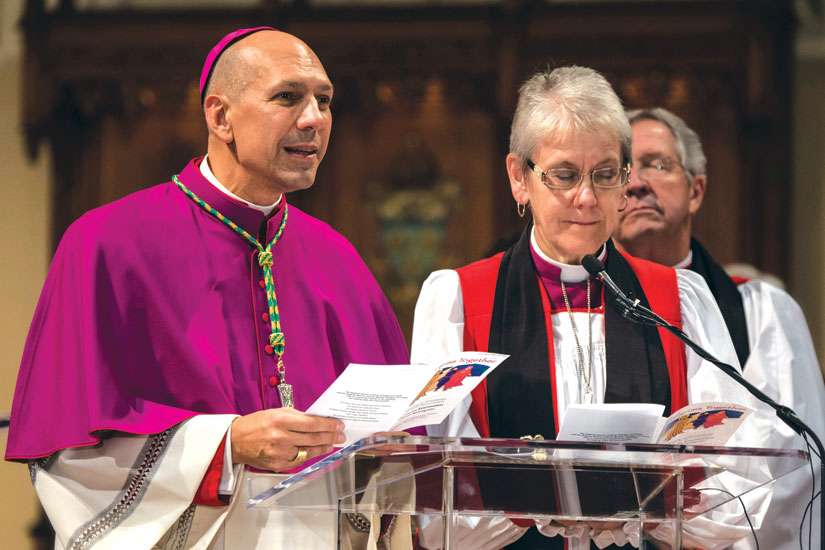The Anglican-Roman Catholic International Commission, better known as ARCIC, rolls into town to puzzle over how Catholics and Anglicans make decisions over ethical questions and to find new ways to sum up its work over the last five decades.
ARCIC is the official ecumenical dialogue between the world’s 85 million Anglicans and 1.3 billion Catholics set up by the Vatican and the Archbishop of Canterbury in 1969.
This is the first time ARCIC has met in Canada, and it gives Canada’s own Anglican-Catholic dialogue partners a chance to rub shoulders with their international counterparts.
The public will have a chance to pray with the theologians and bishops involved in the dialogue and then hear them speak about their work for unity on May 11, beginning with a 7 p.m. evening prayer service in the Basilian chapel on the University of St. Michael’s College campus. At 7:30 the ecumenists will walk across the street to Brennan Hall to hear the co-chairs of Canada’s national Anglican-Catholic dialogue and the international co-chairs speak about the state of the dialogue.
Unknown to most Anglicans and Catholics, their official international dialogue has deeply studied and declared broad agreement on such contentious issues as the importance of the Pope’s role as guarantor of Christian unity, Mary’s role in the life and the devotion of the Church, the centrality of the Eucharist and the Church’s self-understanding that it is first and foremost a communion in Christ. ARCIC documents such as The Gift of Authority, Mary: Grace and Hope in Christ, Life in Christ, Morals, Communion and the Church, The Church as Communion and Salvation and the Church are praised in theological circles as among the most important and articulate statements of Christian belief in our time.
But while the theologians continue to talk, there have been sharp, public disagreements over women and homosexuality.
When Episcopalians, the American branch of the Anglican Communion, ordained an openly gay bishop living with his partner, Pope John Paul II shut down the dialogue in 2003. Ordination of women, particularly as bishops, prompted Cardinal Walter Kasper to accuse the Anglicans of forsaking apostolic tradition. Then the move by Pope Benedict XVI to create a means for entire Anglican congregations to be received into the Catholic Church while retaining elements of Anglican liturgy gave offence to many Anglicans.
“They certainly are stumbling blocks,” Bishop Linda Nicholls, Anglican co-chair of the Anglican Roman Catholic Dialogue of Canada, told The Catholic Register. “They’re not going away. They’re going to continue to be there for us.”
But Nicholls argues that the Anglican Communion’s internal struggles over just how gays are welcomed and recognized in the church and over the equality of women before all the sacraments, including ordination, has only strengthened the case for dialogue.
“One of the things we’ve certainly learned in my own church is, we’ve learned how to have better conversations when we’re in conflict on deeply painful issues,” she said. “We’ve learned how to sit down together and listen in ways we didn’t seem to know how to do before. And that’s not a bad thing.”
The challenge before ARCIC is to find ways to make its excellent theology available, understandable and acceptable to ordinary Christians, said Archdiocese of Toronto Ecumenical and Interfaith Affairs director Fr. Damian MacPherson.
“That’s the hope of all the ecumenical world, that the grassroots would shake the foundations,” he said.
“(The ARCIC documents) certainly speak to the theology-geek world, that’s for sure,” said Nicholls. “The harder question is certainly how do those documents and that ongoing conversation, how do those filter down to the grassroots level… These documents will only exist in the theological-geek world unless we can find ways to put them into practice in working together.”
If the grassroots haven’t been brandishing their copies of The Gift of Authority in the pews, there have been signs of almost accidental hope at the top end of the hierarchy. As Pope Francis has urged a rediscovery of synods and open, frank talk among bishops, Anglicans have been able to see something in Catholics that reflects their understanding of Christian tradition.
Whatever the stumbling blocks, Anglican-Catholic dialogue in itself is a major development in Church history, said Adriana Bara, executive director of Montreal’s Canadian Centre for Ecumenism.
“Discussion between different Christian groups is very important for Christian unity, and Christian unity is the desire of our Lord Jesus Christ,” Bara said.


